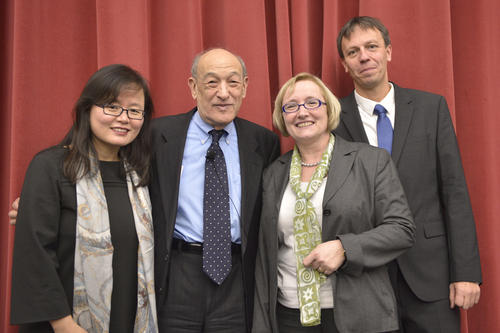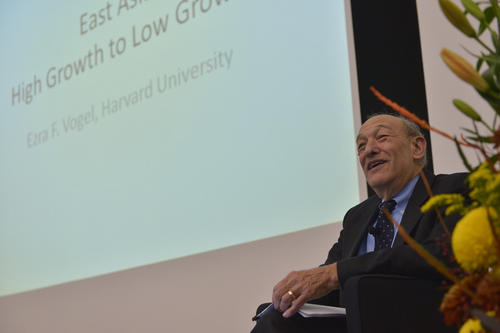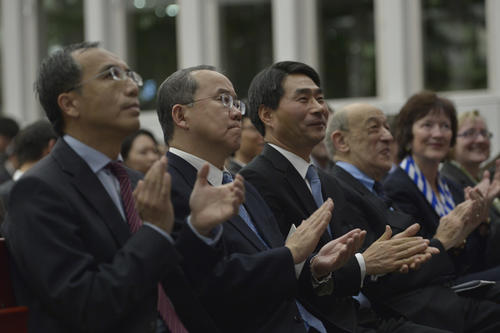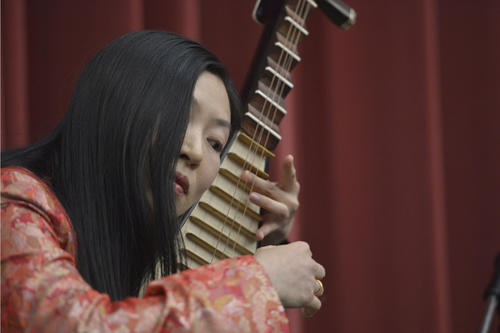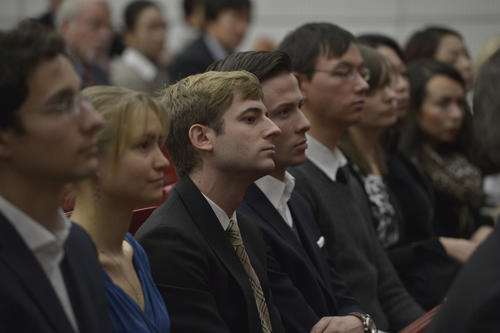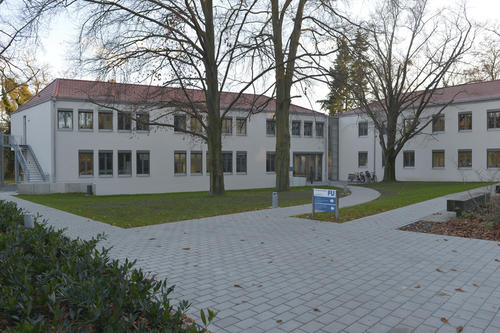“People Who Understand Asia Better Can Make Wiser Decisions”
The Graduate School of East Asian Studies at Freie Universität Berlin educates future experts on one of the world’s most dynamic regions
Nov 29, 2013
The spokespersons for the Graduate School: Prof. Eun-Jeong Lee, Prof. Verena Blechingerová-Talcott, and Prof. Klaus Mühlhahn. Ezra Vogel (2nd from left), professor emeritus from Harvard, gave the keynote address.
Image Credit: Bernd Wannenmacher
The American East Asian specialist Ezra Vogel gave the keynote address.
Image Credit: Bernd Wannenmacher
The Ambassadors of Korea, Japan, and China welcomed the founding of the new Graduate School.
Image Credit: Bernd Wannenmacher
Music from Japan, South Korea, and China accompanied the ceremony. Here Jingyu Zhang is shown playing the pipa, a traditional Chinese lute.
Image Credit: Bernd Wannenmacher
Twelve doctoral students began their work in October 2013.
Image Credit: Bernd Wannenmacher
The Graduate School of East Asian Studies is located in Dahlem on Hittorfstr. 18.
Image Credit: Bernd Wannenmacher
Nowadays there is too much academic specialization, and there are not enough comprehensively educated experts on the region, complained the American expert on East Asia, Ezra Vogel, in his keynote address opening the Graduate School of East Asian Studies (GEAS) at Freie Universität Berlin.
Closing this gap is the goal of the new educational institution, which was granted funding in 2012 in the Excellence Initiative sponsored by the German federal and state governments. It began its work in October, with twelve doctoral candidates. The scholars involved have developed an innovative study program intended to make GEAS a center of European research on East Asia.
When Verena Blechinger-Talcott, professor of Japanese Studies at Freie Universität Berlin and the spokesperson for the graduate school, looks back on her education, she tells how important it was to her to gain not only a solid education in one discipline – in her case, political science – but also knowledge of both Japan and other countries in the region. “At the time, you had to seek it out on your own,” she says, “while for our doctoral candidates, it’s part of the academic program.” At the same time, Blechinger-Talcott says, it is now more exciting and more important than ever to consider Japan, China, and Korea together, and today’s era of globalization offers an outstanding opportunity to see whether things have developed the same way in all of the countries in East Asia or whether there are different development paths in the different nations.
Wide Range of Dissertation Topics
The dissertation projects of the twelve doctoral candidates who started their programs in October attest to the broad spectrum of topics covered at the school. Scholars of political science, for example, are working on topics such as China’s foreign policy and the political party landscape in Korea, Japan, and Taiwan. One doctoral candidate is studying the role of print media in the democratization processes taking place in China and Taiwan, and there will also be cultural-studies dissertations on the topic of giving gifts and on how cultural heritage is treated. With such a broad variety of subjects, program participants need a shared basis for understanding; in this case, that basis is provided by institutional theory, which plays a central role in the participating disciplines, such as political science, history, and social and cultural anthropology. The goal is to bring together extensive knowledge of the region with academic rigor.
Innovative Academic Program
The academic program offered at the school, which moved into a renovated building between Hittorfstraße and Thielallee this past summer, pools together the fields of East Asian Studies, which are very well represented at Freie Universität Berlin. It is very unusual, Blechinger-Talcott points out, for a single university to have professorships for Japanese, Chinese, and Korean studies. The other spokespersons for the school are Eun-Jeung Lee, professor of Korean Studies, and Klaus Mühlhahn, professor of Chinese Studies at Freie Universität Berlin. There is also one representative of each of the three main countries studied at the school among the postdocs and the future junior professors.
Other integral components of the GEAS program include presentations and contact with working professionals, such as politicians, diplomats, and representatives of the business sector. The aim of this is twofold: first, to prepare graduates for more than just a career in the academic world, and second, to broaden their perspectives on their own academic subjects of inquiry. That, too, is an idea Blechinger-Talcott took away from a stay abroad as a postdoc: During her time as a research fellow at Harvard, she found these encounters to be highly enriching.
Existing networks with cooperating higher education institutions in East Asia make academic exchange possible: All of the doctoral candidates are supposed to spend at least six months at a partner university in China, Japan, or South Korea while working on their dissertations. There are also plans for summer schools in the three countries to deepen participants’ knowledge of all East Asian countries and their understanding of the commonalities and differences that have emerged over the region’s history and in the present day.
Broad Perspectives
Another sign of the close connection between GEAS and the region was the welcome addresses given by the Japanese ambassador, H.E. Nakane Takeshi, the Korean ambassador, H.E. Kim Jae-shin, and the Chinese envoy, Li Xiaosi, at the school’s opening. Keynote speaker Ezra Vogel offered an overarching perspective on the region by drawing parallels between the rapid rise Japan experienced in the 1960s, becoming one of the world’s leading economic powers, and the upward development of Korea and the economic growth currently being experienced in China. More than almost any other scholar of East Asian studies, Vogel, a professor emeritus from Harvard, has striven throughout his academic career to take this kind of overarching view. His publications, which have made him known even outside the academic world, range from a monograph on the new Japanese middle class, published in 1963, to a biography of Deng Xiaoping that was just released recently.
Vogel called the graduate school’s overarching educational concept a huge opportunity and explained that both political science and the field of economics and business now require a great deal of methodological and theoretical knowledge, often at the expense of knowledge about the countries themselves. Scholars of East Asian studies with a detailed understanding of the region and with language skills and cultural knowledge are, however, urgently needed, and the school’s graduates will have both, with disciplinary and methodological knowledge alongside regional expertise and excellent language skills. “An economist has to know the history. It is always a particular political situation in a particular time,” Vogel said, and added, “People who understand Asia better can make wiser decisions.”
Further Information
Prof. Dr. Verena Blechinger-Talcott, Freie Universität Berlin, Japanese Studies, Tel.: +49 30 838-57104, Email: vblechin@zedat.fu-berlin.de

